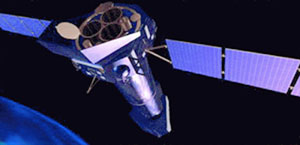|
|
The X-ray Multi-Mirror Mission (XMM-Newton)

The European Space Agency’s X-ray Multi-Mirror
Mission (XMM-Newton) was launched by Ariane 504 on December 10 1999.
XMM-Newton is
ESA’s second cornerstone of the Horizon 2000 Science Programme. It
carries high thoughput X-ray telescopes with an unprecedend effective
area, and an optical monitor, the first flown on a X-ray observatory.
The large collecting area and ability to make long uninterrupted
exposures provide highly sensitive observations.
Mission Characteristics
 Lifetime :
December 1999 - (nominal 10 year mission)
Lifetime :
December 1999 - (nominal 10 year mission)
 Energy Range :
0.1-15 keV
Energy Range :
0.1-15 keV
 Special Features :
Very large collecting area.
Special Features :
Very large collecting area.
Simulataneous X-ray & Optical observations.
 Payload : Payload :
- Three co-aligned Wolter Type I grazing incidence gold-coated imaging
X-ray telescopes each with an effective area of ~ 1500
cm2 @ 1 keV
Spatial resolution 6" FWHM. There are three type of instruments :
- European Photon Imaging Camera
Metal-Oxide-Silicon (EPIC-MOS; 0.1-15 keV; 2 units)
The EPIC-MOS are mounted under two telescopes and
are used for spectro-imaging.
Each units consist of an array of 7 CCDs
and each CCD is 600 X 600 pixels
FOV 33 ´ X 33 ´
spectral resolution (E/dE) ~ 20-50
Eff area 922 cm2 @ 1keV
- European Photon Imaging Camera-PN
(0.1-15 keV; 1 unit)
This is an array of 12 CCDs (64 X 200 pixels each)
used for spectro-imaging
FOV 27.5 ´ X 27.5 ´
spectral resolution (E/dE) ~ 20-50
Eff area 1227 cm2 @ 1keV
- Reflection Grating Spectrometer
(RGS; 0.35-2.5 keV two units) + EPIC-MOS
The gratings, mounted under two telescopes, deflect
about 50% of the X-ray light onto an array of 9 EPIC-MOS
CCD detectors.
Line density ~645 lines mm-1 at the centre
Spectral resolution (E/dE) 200-800
Eff area 185 cm2 1 keV
FOV 5´
- Optical Monitor (OM; 180-650 nm)
co-aligned 30 cm optical/UV
telescope. FOV ~17´, ~1" spatial resolution.
 Archive : HEASARC hosts the XMM-Newton data archive and Catalogs.
Archive : HEASARC hosts the XMM-Newton data archive and Catalogs.
[XMM-Newton Guest Observer Facility]
[All Missions]
[by Time]
[by Energy]
Page authors: Lorella Angelini Jesse Allen
HEASARC Home |
Observatories |
Archive |
Calibration |
Software |
Tools |
Students/Teachers/Public
Last modified: Thursday, 24-Sep-2020 21:42:15 EDT
|


